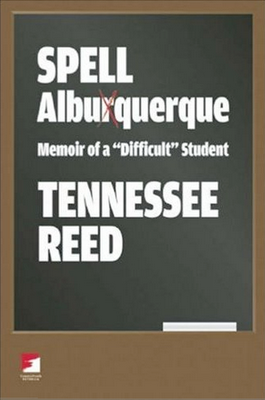Spell Albuquerque: Memoir of a “Difficult” Student

I found Tennessee Reed’s memoir of her educational and professional life to be inspiring and informative. In her memoir, Reed shows the difficulties that learning and physically disabled students encounter in the public and private educational system, and provides suggestions about what can be done to combat racism, institutional authority, and insensitivity.
Between the age of eighteen months and two years of age, Reed, the daughter of writer/choreographer Carla Blank and novelist Ishmael Reed, was diagnosed with a speech and language-based communication disorder, aphasia. Similar to a condition that stroke and head trauma victims experience, this condition prevented Reed from developing normal speech patterns. In addition to aphasia, Reed had difficulty with reading comprehension, three dimensional perception, and tasks that require small muscle control and hand eye coordination; she was also diagnosed with a math disability and Attention Deficit Hyperactivity Disorder (ADHD) in 1998.
Despite having several learning and physical disabilities, Reed was able to navigate through the school system from pre-school through graduate school. In Spell Albuquerque: Memoir of a “Difficult” Student, she writes about her experiences as a student, a published writer, and a candidate for the Oakland, California School Board.
Reed encountered difficulty throughout her educational experience, due to insensitive administrators and inexperienced instructors. She gives several examples of being humiliated and ridiculed by school principals, classroom teachers, and other students when she did not perform according to their expectations. As a child, Reed was powerless against the inconsistent behavior and teaching methods of her instructors. But as a teenager and as an adult, she began to question and challenge her teachers and professors. When she encountered racism in addition to discrimination based on her disabilities, she fought back against assumptions that others made about her.
Despite her difficulties with the traditional educational system, Reed became a success. A talented writer, she earned a Master of Fine Arts degree from Mills College; worked as a tutor in the AmeriCorps program between undergraduate and graduate school; and has published five books.
In 2008, she decided to run for a campaign for a seat on the Oakland School Board. The focus of Reed’s campaign was to inform voters of the issues that affected minority, poor, and learning-disabled students. Specifically, she focused on standardized tests, textbooks and curriculum, overcrowded classrooms, school closures, the need for physical education and the arts, creativity, charter schools, and teacher credentials. Although Reed did not win the seat, she received ten percent of the vote and was able to put issues affecting minority, poor, and disabled students on the table.
Reed demonstrates in her memoir that at times minority, poor, disabled, and gay/lesbian/bisexual/transsexual students may have to work harder to succeed in society and she provides a great example of what can be accomplished when we focus on students’ strengths.
I've heard really good things about this one. Nice review!
Thanks for reviewing this. Adding it to my 'to be read' list for sure.
What an inspiring story! As a speech-language pathologist, I work with children who are at risk for being written off, squeezed out, and given up on--by their peers, their teachers, their families, and (most tragic of all) themselves. Every child is an expert on something and has a contribution to make. Reed's story illustrates this beautifully.